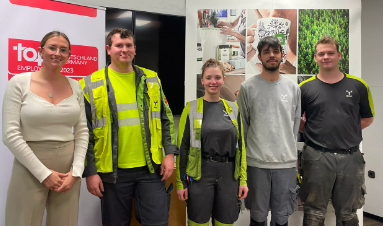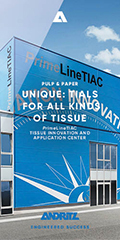
| Archive/Subscribe | TAPPI.org | Advertise | TAPPI Press Catalog | February 2023 |
Metsä Group Invests in Fossil Free Future
Metsä Group, through its tissue business Metsä Tissue, has made a decision to invest in world leading environmental performance in tissue production by modernizing and expanding Metsä Tissue’s Mariestad tissue paper mill in Sweden. The investment will increase the availability of locally and sustainably produced tissue products in the Scandinavian market, in which approximately 40 percent of tissue usage is currently imported. The value of the investment is EUR 370 million and it is one of the largest in the tissue business in Europe and the largest within Metsä Tissue. The construction works will start during spring 2023 and the renewed mill is planned to be operational in the second half of 2025. With this investment Metsä Tissue will be a forerunning company in investing into sustainable tissue production in Sweden and Scandinavia with its strong brands Lambi, Serla and Katrin. The investment will help to safeguard the security of supply in daily hygiene tissue products with the state-of-the-art mill expansion utilizing most advanced technology. The modernization and expansion investment is part of Metsä Tissue´s Future Mill Program which targets world leading environmental and operational performance in tissue production. “Tissue production is local and it is not sustainable to transport tissue products across long distances. These daily necessity products need to be available in all situations and sustainable local production helps to safeguard the security of supply in the market. This investment aims at just that – availability of sustainable, locally made tissues in a region, which is currently one of the largest net importers of tissue finished goods in Europe. We are proud to develop this business to even more sustainable and locally driven to make what we think are the best tissues in the world, available to consumers in all situations,” says CEO Esa Kaikkonen, Metsä Tissue. The mill produces high quality Lambi, Serla and Katrin tissue products for both consumer and professional use and the current capacity will be doubled to approximately 145,000 t/a. After the expansion the mill will have a new modern tissue paper machine with the capacity of 70,000 t/a, three new converting lines, for both rolled and folded tissues. Also a fully automated warehouse for finished goods and raw material handling will be built as well as a new office facility. Improved energy efficiency, lower emissions and improved noise and odor plans used as design criteria in the new expansion The expansion of the Mariestad mill will bring considerable improvements in the environmental performance of tissue production. Despite the doubled production capacity, the fossil CO2 emissions will drop to zero latest by 2030 due to new technology in use. The expansion will focus purely on sustainable fresh fiber production, after which the total fresh fiber share at the mill is 80 percent. The water consumption per ton will be diminished by 50 percent to 10 m3/t because of the new paper machine technology, fresh fiber based production and effluent plant modernization which is enabling better utilization of purified water in the Mariestad’s mill water circulation. Tissue as a bulky product with high air content is not economically viable nor sustainable to transport long distances. Logistics emissions are planned to drop by 25 percent per year due to replacing paper imports with local production. The modernization brings improvements also to the mill’s neighborhood. With the modern production technology, the mill will have lower noise and odor levels than today. A new noise barrier will lower the noise levels by 3-5 dBA because of new embankments between the mill and residential area and additional 26 silencers will block noise effectively. The mill will be equipped with new technology for water management and more efficient technology for purification, which will have a positive effect on odors. The majority of the new water treatment equipment will be covered, further improving the odor management. Significant impact on local employment. Through this investment Metsä Tissue will be hiring around 100 people at the mill before the new extension is in operation. The majority, approximately 75 percent, will be multiskilled production workers with technical competences. The recruitment for the key positions, like Production Engineers and Automation Specialists, will begin already this year. During the construction phase, the total employment impact is estimated to be around 2,000 person-years. Manufacturing at the mill will continue normally during the expansion.
|




